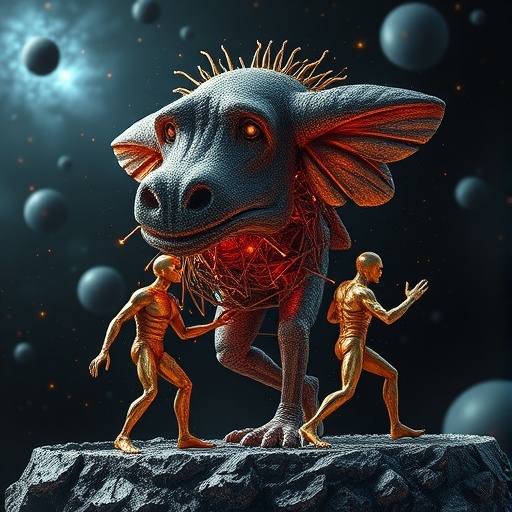A groundbreaking study emerging from the Institute for Biology Education has unveiled transformative insights into how the pedagogical framing of evolutionary biology dramatically shapes the cognitive architectures that students develop. By focusing on the role of ‘threshold concepts’—particularly abstraction-heavy notions such as randomness and probability—educators may enhance the interconnectedness, coherence, and sophistication of students’ conceptual frameworks in evolutionary biology, potentially revolutionizing biology education at the secondary school level.
This pivotal research, entitled “Threshold Concepts and Concept Networks in Evolution Education: An Experimental Intervention Study”, published in the esteemed journal Science Education, delves into the cognitive webs students build while grappling with evolution. Conducted by a collaborative team composed of Professor Dr. Jörg Großschedl of the University of Cologne, Dr. Helena Aptyka also from Cologne, and Dr. Daniela Fiedler of the University of Copenhagen, this experimental study sheds light on the intricate interplay of accurate scientific concepts, entrenched misconceptions, and the indispensable yet elusive threshold concepts students encounter.
At the core of the study lies the analysis of ‘concept networks’—the complex mental maps comprising scientifically accurate key concepts, common misconceptions, and threshold concepts that students synthesize during biology lessons. These mental models are not only an amalgamation of facts but also represent how learners internally relate diverse ideas of evolutionary theory. Understanding the topology and density of these networks offers a window into how deeply and effectively students assimilate evolutionary principles.
.adsslot_xiOlnHMXpV{ width:728px !important; height:90px !important; }
@media (max-width:1199px) { .adsslot_xiOlnHMXpV{ width:468px !important; height:60px !important; } }
@media (max-width:767px) { .adsslot_xiOlnHMXpV{ width:320px !important; height:50px !important; } }
ADVERTISEMENT
Key concepts refer to the foundational, scientifically validated ideas critical for a robust comprehension of evolution. Terms such as genetic variation, inheritance, and individual fitness stand as pillars explaining natural selection and evolutionary dynamics. Contrastingly, misconceptions, deeply ingrained cognitive errors often rooted in everyday reasoning, perpetuate misunderstandings. For instance, teleological fallacies—the belief that organisms develop traits out of necessity or foresight—exemplify such misconceptions and act as barriers to the acceptance of evolutionary theory.
What sets this study apart is its emphasis on threshold concepts: those difficult, transformative ideas that function as intellectual gateways, enabling students to transcend superficial understandings and achieve high-level cognitive breakthroughs. In evolutionary biology, the probabilistic and stochastic nature of natural selection embodies such threshold concepts, demanding learners to abandon deterministic and goal-directed notions in favor of embracing randomness and chance as central evolutionary drivers.
The research employed a robust experimental intervention approach involving 10th-grade students, keenly examining how integrating threshold concepts into biology curricula influenced the structural complexity of students’ concept networks. Results revealed that when threshold concepts were explicitly addressed, students exhibited markedly richer networks characterized by dense interconnections and hierarchical organization, reflecting a superior grasp of evolutionary theory.
Professor Großschedl articulated the significance of these findings by highlighting the innovative horizon that network analysis of student concepts opens for science education. By mapping the interrelationships between varying conceptual nodes, educators can gain unprecedented insights into how meaning is constructed and misconceptions overcome, thereby tailoring instruction to scaffold authentic understanding more effectively.
Moreover, Dr. Aptyka emphasized that while students possess the inherent capacity to weave together multiple evolutionary concepts, targeted instructional scaffolding centered around threshold concepts is essential to catalyze and sustain these integrative processes. This experimental evidence suggests that biology education, traditionally fragmented and prone to superficial memorization, can be fundamentally restructured for deeper cognitive integration.
In addition to illustrating theoretical implications, the study offers practical pedagogical pathways. Implementing curriculum modules that explicitly explore randomness and probability within evolutionary contexts can encourage students to engage in higher-order thinking praxis, transforming abstract notions into tangible cognitive tools. This instructional pivot can dismantle persistent teleological misconceptions, replacing them with nuanced appreciation of evolutionary mechanisms.
The team’s findings also prompt exciting future research trajectories. Building on the current study, there are plans to examine the threshold concept of temporal scales—an area encompassing the comprehension of microevolutionary changes occurring over short timespans and macroevolutionary patterns observable across vast temporal horizons. Clarifying how students internalize these scales could refine teaching approaches, further enriching the understanding of evolutionary processes and deepening scientific literacy.
From a broader educational standpoint, the implications stretch beyond evolution education. The approach of leveraging threshold concepts to restructure concept networks could be adapted across other complex scientific domains, fostering cognitive breakthroughs in fields such as physics, chemistry, and environmental science. This may herald a new era where education moves toward fostering systemic reasoning and conceptual coherence rather than rote accumulation of discrete facts.
Critically, the integration of threshold concepts aligns with constructivist pedagogical theories, underscoring learning as an active, transformative process rather than passive absorption. Teaching methods that encourage students to confront and revise their misconceptions through engagement with challenging yet pivotal threshold ideas catalyze genuine conceptual change—a prerequisite for enduring scientific understanding.
As science education confronts the twin challenges of misinformation and scientific skepticism, enhancing conceptual networks through targeted interventions holds promise for empowering future generations with the cognitive tools to navigate complexity, evaluate evidence critically, and appreciate the dynamic nature of scientific knowledge.
The findings by Großschedl, Aptyka, and Fiedler contribute a compelling narrative that teaching evolution need not be limited to factual transmission but can become a transformative cognitive enterprise. By reconceptualizing evolution education through the lens of threshold concepts and concept networks, educators can nurture sophisticated, interconnected mental models that reflect the intricate beauty and reality of evolutionary science.
Subject of Research: People
Article Title: Threshold Concepts and Concept Networks in Evolution Education: An Experimental Intervention Study
News Publication Date: 21-May-2025
Web References: 10.1002/sce.21977
Keywords: Evolution Education, Threshold Concepts, Concept Networks, Biology Teaching, Misconceptions, Randomness, Probability, Natural Selection, Science Education, Cognitive Development, Pedagogical Intervention
Tags: cognitive development in science educationconcept networks in biology teachingenhancing student understanding of evolutionevolution education strategiesexperimental studies in science educationinterdisciplinary collaboration in biology researchmisconceptions in evolutionary biologypedagogical approaches to evolutionrandomness and probability in evolutionsecondary school biology curriculumthreshold concepts in biologytransformative insights in biology education





